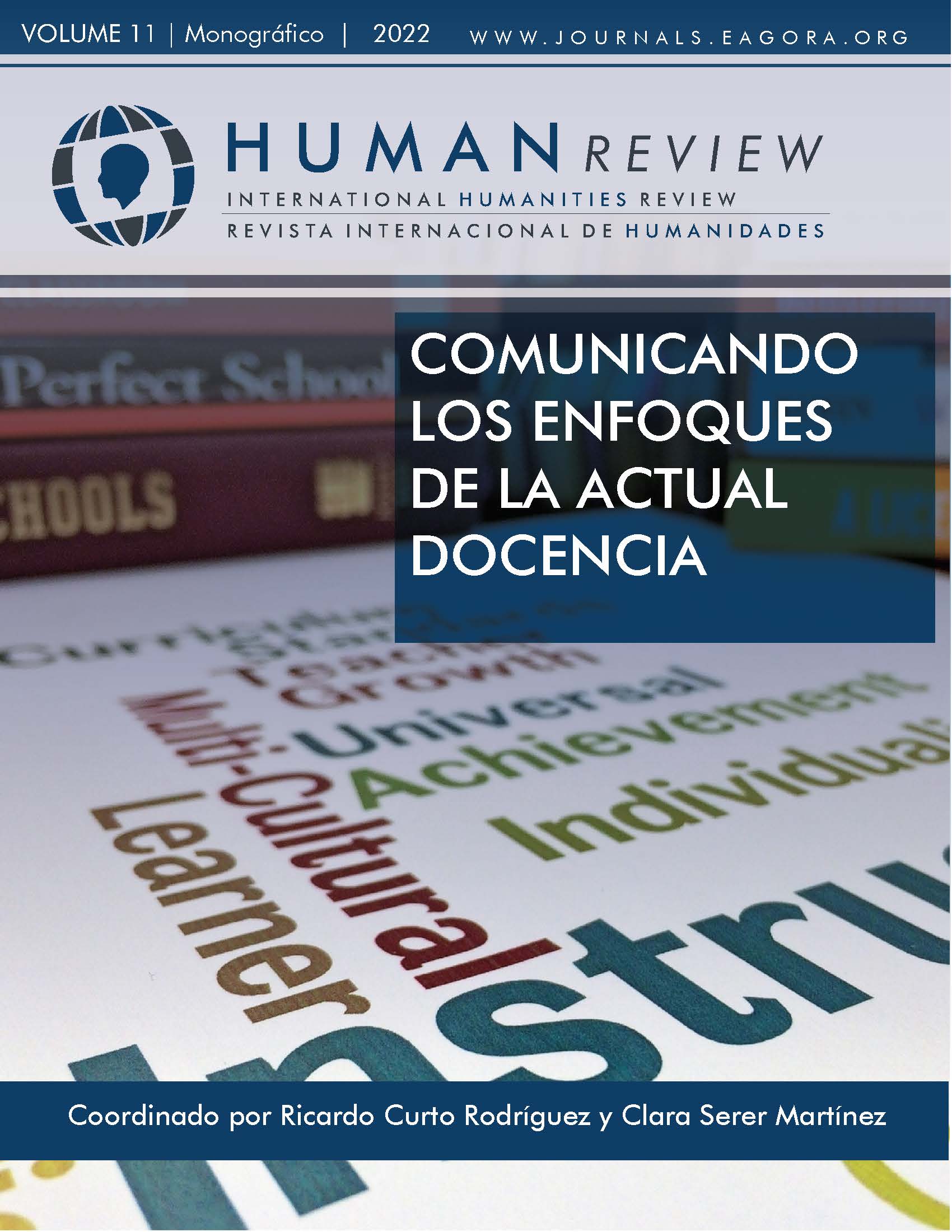Assessment criteria and formative feedback: teachers’ perspectives
Keywords:
Criteria, Quality, Learning, Negotiation, Autonomy, Feedback, TeachersAbstract
This work examines the different teachers’ perspectives when externalising assessment criteria. A number of findings from a doctoral research are exposed. These address, on the one hand, an analytical methodology that seeks clarity and transparency while communicating criteria, and also by decomposing the learning goal into small sequences, conveying an atomized idea of what knowledge is. On the other hand, it explores a more holistic standpoint that foregrounds in the interrelationship amongst assessment criteria by allowing the understanding of the task as a whole. Moreover, the influence of both approaches with regards to feedback and formative assessment is analysed.
References
Alexander, R. J. (2008) Towards Dialogic Teaching. Rethinking classroom talk. Dialogos.
Berg, B. & Lune, H. (2012). Qualitative Research Methods for the Social Sciences. Pearson.
Black, P. & Wiliam, D. (1998). Assessment and Classroom Learning. Assessment in Education. Principles, Policy & Practice, 5(1), 7–74. DOI: https://doi.org/10.1080/0969595980050102
Black, P. & Wiliam, D. (2003). In praise of educational research: Formative assessment. British Educational Research Journal, 29(5), 623-637. DOI: https://doi.org/10.1080/0141192032000133721
Black, P. & Wiliam, D. (2009). Developing a Theory of Formative Assessment. Educational Assessment Evaluation and Accountability, 21, 5–31. DOI: https://doi.org/10.1007/s11092-008-9068-5
Black, P., Harrison, C., Lee, C., Marshall, B. & Wiliam, D. (2003). Assessment for Learning: Putting it into Practice. Open University Press.
Black, P. & Wiliam, D. (2012). Developing a Theory of Formative Assessment. In J. Gardner (Ed.) Assessment and Learning (Assessment in Education) (pp. 206-229). SAGE Publications. DOI: https://doi.org/10.4135/9781446250808.n13
Bloom, D., Power Carter, S., Beth Morton, C., Madrid, S., Otto, S.; Shuart – Faris, N. & Smith, M., (2008). On Discourse Analysis in Classrooms. Approaches to Language and Literacy Research. Columbia University.
Bloom, D., Beirle, M., Grigorenko, M. & Goldman, S. (2009). Learning over time: uses of intercontextuality, collective memories, and classroom chronotopes in the construction of learning opportunities in a ninth-grade language arts classroom. Language and education, 23(4), 313-334. DOI: https://doi.org/10.1080/09500780902954257
Cohen, L., Manion, L. & Morrison, K. (2011). Research Methods in Education (seventh ed.). Routledge.
Charmaz, K. (2006). Constructing grounded theory: A practical guide through qualitative research. Sage Publications Ltd.
Hammersley, M. & Atkinson, P. (2007). Ethnography.Taylor & Francis Group. DOI: https://doi.org/10.1002/9781405165518.wbeose070
James, M. (2006) Assessment, Teaching and Theories of Learning, in J. Gardner (ed.) Assessment and Learning, (first edition) (pp. 47-60). SAGE Publications.
Kvale, S. & Brinkmann, S. (2009). Interviews: Learning the craft of qualitative research (second ed.). SAGE Publications.
Mansell, W., James, M. & the Assessment Reform Group. (2009). Assessment in Schools. Fit for purpose? A commentary by the teaching and Learning Research Programme. Economic and Social Research Council, Teaching and Learning Research Programme.
Marshall, B. (2004). Goals or horizons-the conundrum of progression in English: or a possible way of understanding formative assessment in English. The curriculum Journal, 15(2), 101-113. DOI: https://doi.org/10.1080/0958517042000226784
Marshall, B. & Drummond, J. (2006) How teachers engage with assessment for learning: lessons from the classroom. Research Papers in Education, 21(2), 133- 149. DOI: https://doi.org/10.1080/02671520600615638
Mason, J. (2002). Qualitative Researching (second ed.). SAGE Publications.
Mercer, N. (2000) Words and Minds. How we use language to think together. Routtledge.
Perrenoud, P. (1998). From Formative Evaluation to a Controlled Regulation of Learning Processes. Towards a Wider Conceptual Field, Assessment in Education. Principles, Policy & Practice, 5(1), 85–102. DOI: https://doi.org/10.1080/0969595980050105
Sadler, D. R. (1989). Formative Assessment and the Design of Instructional Systems. Instructional Science, 18, 119–144. DOI: https://doi.org/10.1007/BF00117714
Sadler, D. R. (2007). Perils in the meticulous specification of goals and assessment criteria. Assessment in education: Principles, Policy & Practice, 14(3), 387-392. DOI: https://doi.org/10.1080/09695940701592097
Sadler, D. R. (2010). Beyond feedback: developing student capability in complex appraisal. Assessment & Evaluation in Higher Education, 35(5), 535-550. DOI: https://doi.org/10.1080/02602930903541015
Silverman, D. (2011). Interpreting Qualitative Data (fourth ed.). London: SAGE Publications Ltd.
Swaffield, S. (2011). Getting to the heart of authentic Assessment for Learning. Assessment in Education: Principles, Policy & Practice, 18(4), 433-449. DOI: https://doi.org/10.1080/0969594X.2011.582838
Torrance, H. & Pryor, J. (1998). Investigating Formative Assessment. Teaching, Learning and Assessment in the classroom. Open University Press.
Torrance, H. & Pryor, J. (2001). Developing Formative Assessment in the Classroom: using action research to explore and modify theory. British Educational Research Journal, 27(5), 616-631. DOI: https://doi.org/10.1080/01411920120095780
Yáñez - Monje, V. (2017). Exploring Teachers’ Interpretations of Feedback in Primary Literacy Classroom Settings (Doctoral’s thesis, King’s College London, England). Retrieved from https://kclpure.kcl.ac.uk/portal/en/persons/veronica-yanezmonje(9432e582-108b-489e-9db7-
Downloads
Published
How to Cite
Issue
Section
License
Those authors who publish in this journal accept the following terms:
- Authors will keep the moral right of the work and they will transfer the commercial rights.
- After 1 year from publication, the work shall thereafter be open access online on our website, but will retain copyright.
- In the event that the authors wish to assign an Creative Commons (CC) license, they may request it by writing to publishing@eagora.org





